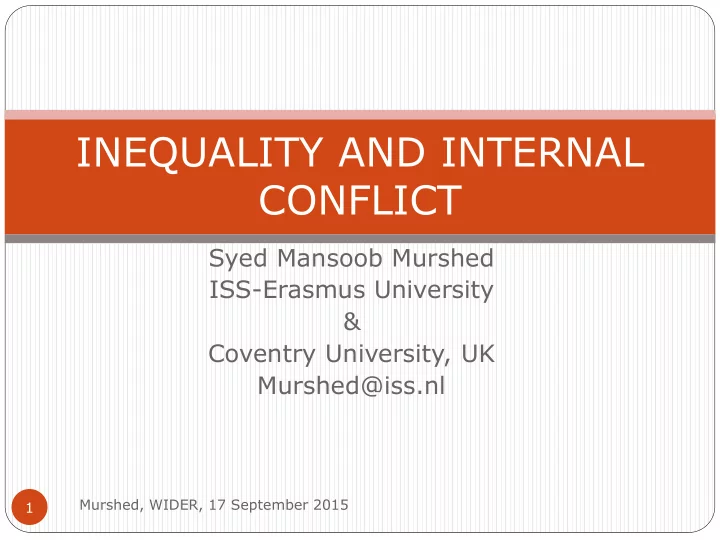

INEQUALITY AND INTERNAL CONFLICT Syed Mansoob Murshed ISS-Erasmus University & Coventry University, UK Murshed@iss.nl Murshed, WIDER, 17 September 2015 1
INTERNAL CONFLICT AND UNDER-DEVELOPMENT This topic has received a great deal of attention recently: Development Community Conflict Perpetuates Poverty. Poverty makes civil war more likely Strategic Studies Community post cold war Failed States Complex Humanitarian Crises: military interventions and refugee influxes Murshed, WIDER, 17 September 2015 2
Ergo Poverty Alleviation State Building Murshed, WIDER, 17 September 2015 3
Causes of Conflict 21 st Century Aristotle’s Politics Avariciousness Greed or opportunity State’s Incompetence Weak State Capacity Inequality Grievance Murshed, WIDER, 17 September 2015 4
GREED: Collier and associates A Motivation akin to Banditry Desire to control Natural Resource Exports Found not to be robust to different definitions of natural resource dependence or abundance Better at predicting conflict duration Focus should be on lootable resources: oil/gas and alluvial diamonds Murshed, WIDER, 17 September 2015 5
Greed: Poverty-Conflict Trap Nuanced version of greed: Contextualised to where poverty is endemic, because: Poverty makes soldiering a less unattractive livelihood strategy Civil war perpetuates poverty and vice versa Murshed, WIDER, 17 September 2015 6
Weak State Capacity The State’s Ability to: Coerce: forcefully deter rebellion Cajole: Provide Security and Public Goods The above require resources; otherwise security and public goods are ‘privatised’. Civil war may hamper state fiscal capacity Weak fiscal institutions Reliance on aid and resource rents Low tax/GDP ratio Murshed, WIDER, 17 September 2015 7
Both greed and weak state capacity arguments ignore Grievance producing INEQUALITY and DISCRIMINATION. WHY? Empirical: Data on between group inequality (not just socio-economic class) is hard to come by and therefore ignored. Theoretical: Grievances are infinite, ubiquitous and omnipresent. Rebellion has to be feasible and financially viable. Argued earlier by Charles Tilly as mobilization theory. Murshed, WIDER, 17 September 2015 8
Nature of Inequality Would not matter if there is no uncertainty and a level playing ground for life chances. Good Inequality (of outcome): Human beings are incentivised by rewards and punishments; ergo, too much inequality can discourage effort (not always pecuniary). BAD Inequality: Categorical-Durable Inequalities (Charles Tilly) Inequalities of Opportunity (John Roemer) Murshed, WIDER, 17 September 2015 9
Bad Inequalities are hard to Shift: What is harder to shift? Income Inequality Or an inequality based upon systematic discrimination of a group Inequalities of Opportunity Disadvantaged socio-economic background Employment discrimination: race, religion, ethnicity Political exclusion of certain ethnicities Murshed, WIDER, 17 September 2015 10
Two Non-Mutually exclusive Developments in Economics The Economics of Identity Behavioural Economics Murshed, WIDER, 17 September 2015 11
Individual and Group Identity Individuals identify with groups If their group is disadvantaged even if the individual is not They act according to group norms: In some circumstances errant individuals can be brought back to conformity with group norms, particularly in closely knit poor communities Murshed, WIDER, 17 September 2015 12
Behavioural Economics: An individual’s preferences are not exclusively innate, but are a product of life experiences, history and a variety of psycho-social phenomena People dislike ultimata Prefer fairness even if personally worse off Murshed, WIDER, 17 September 2015 13
Conflict and Inequality Individuals may choose to participate in group causes, and even fight. What is salient in this regard? Two concepts: Relative Deprivation (Ted Gurr): individuals who are left behind Horizontal Inequality (Frances Stewart): inequalities between groups based on ethnicity, caste, class, religion Economic dimension Political dimension Murshed, WIDER, 17 September 2015 14
Growth and Inequality Growth can increase both poverty and inequality, as is common now. Although average income rises poverty can rise because it is so unequally distributed. Inequalities of opportunity intensify Growth can reduce poverty but raise inequality Some countries reduce both (Brazil recently) Truly pro-poor growth reduces both inequality and poverty Murshed, WIDER, 17 September 2015 15
Globalisation and Conflict Increased globalisation (more international trade) worsens the distribution of income Policies to foster globalisation (increased inward investment, say) can lead to wage compression Both the above can cause relative deprivation if say the income share of the top 10% rise at the expense of the bottom 40%. Murshed, WIDER, 17 September 2015 16
New Forms of Conflict Mass protest Isolated insurgencies in economically ‘successful’ democracies like (Maoist insurgencies) in India Rising sectarian violence Murshed, WIDER, 17 September 2015 17
Recommend
More recommend